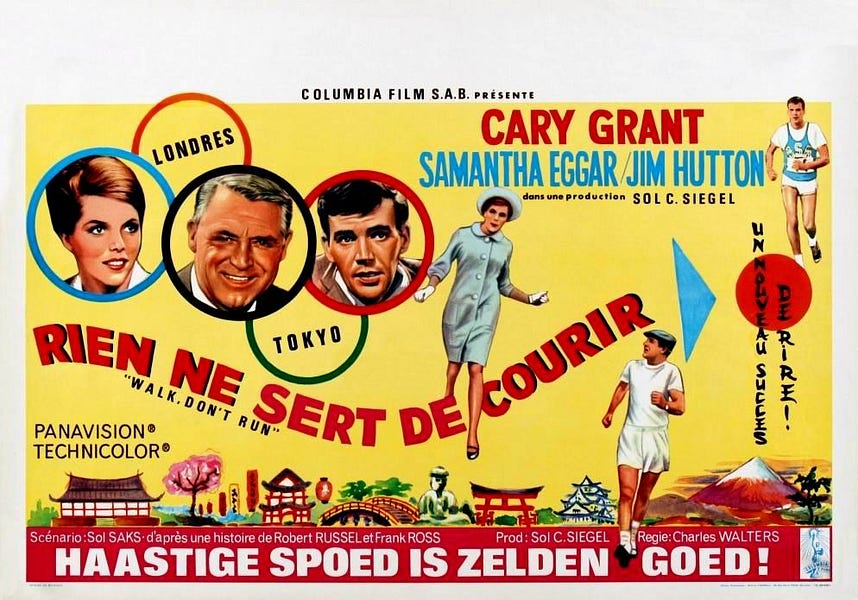The opening ceremony at the Tokyo 2021 Olympics yesterday marked the start of the first time the Japanese capital has hosted the Olympic Games since 1964; and with a ban on international visitors, this year will look remarkably different from Olympics past. But, for a reminder of what the Tokyo Olympics would look like under normal circumstances—which is mostly to say “crowded”—we’ve got Walk, Don’t Run, a rom-com starring Cary Grant set during Tokyo’s last turn hosting the Summer Olympics.
Walk, Don’t Run was actually shot on location at the Olympics, capturing how the games took over the city, filling it with not just athletes, but tourists and journalists and businessmen too. Filling it so much, in fact, that when Sir William Rutland (Grant) arrives two days before his hotel reservation, he finds there’s not a single bed available in the entire city. He manages to sweet talk fellow Brit Christine Easton (Samantha Eggar) into subletting her living room to him, despite her misgivings about sharing an apartment with a man. Rutland in turn is talked into subletting half of his sublease to Steve Davis (Jim Hutton), an American athlete and architect who arrived early to see Tokyo’s most impressive architectural accomplishments. Rutland decides Davis is a much better fit for Easton than her current beau, Julius P. Haversack (John Standings), and plays matchmaker. Hijinks ensue.
The film is a sweet little light comedy—Grant’s last film before he retired to focus on raising his newborn daughter in 1966, making it noteworthy for that alone—that takes viewers throughout Tokyo, showcasing the city and the massive changes it underwent in preparation for the Olympics. Japan won the bid to host the 1964 Olympic Games in 1959, in the midst of its post-war economic boom. The Japanese capital, however, was still marked by the devastation of World War II and lacked key infrastructure, like an operational sewage system and a network of roads. Government officials used the Olympics as an opportunity to overhaul the city, adding modern buildings, creating highways, and finishing a bullet train project to connect the capital to other cities. This reconstruction was focused on creating a new, gleaming, modern city, and that came at the expense of more traditional Japanese buildings and at the expense of citizens whose homes were in the way of the creation of that city.
(Reuters reported the sad story of one man, Kohei Jinno, who was evicted from his home twice for Olympic construction; first in 1964 so the space could be used for the National Stadium, then again at the age of 80, once again for stadium construction.)
Walk, Don’t Run is, of course, more focused on the romantic comedy at play than on celebrating or condemning the accomplishments of the Japanese government in preparing for the Olympics, but it does still manage to capture the convergence of old and new taking place in Tokyo in 1964, showing off the city’s new high-rises and Olympic stadiums, but also taking the audience to the more traditional side of Japan, highlighting the old architecture of minkas—traditional Japanese homes—and Japanese gardens. So too, it encapsulates the ethos of the Olympics at its best; the idea of international cooperation and camaraderie. Davis befriends a Soviet athlete Yuri Andreyovitch (Ted Hartley), the main trio dines and dances with an assortment of international athletes, and all the leads engage with Japanese culture in a respectful manner.
While the decision to prohibit international tourists and even domestic fans at the Olympics this year doesn’t affect most of us directly, it is still all of our loss. But Walk, Don’t Run gives us an opportunity to place ourselves in Tokyo in the middle of it all; reminding us of what life is like in a city hosting the world’s most prestigious sporting events when there isn’t a pandemic at play. And with COVID still robbing us of a normal Olympics, who wouldn’t want to remember that?









Please note that we at The Dispatch hold ourselves, our work, and our commenters to a higher standard than other places on the internet. We welcome comments that foster genuine debate or discussion—including comments critical of us or our work—but responses that include ad hominem attacks on fellow Dispatch members or are intended to stoke fear and anger may be moderated.
You are currently using a limited time guest pass and do not have access to commenting. Consider subscribing to join the conversation.
With your membership, you only have the ability to comment on The Morning Dispatch articles. Consider upgrading to join the conversation everywhere.